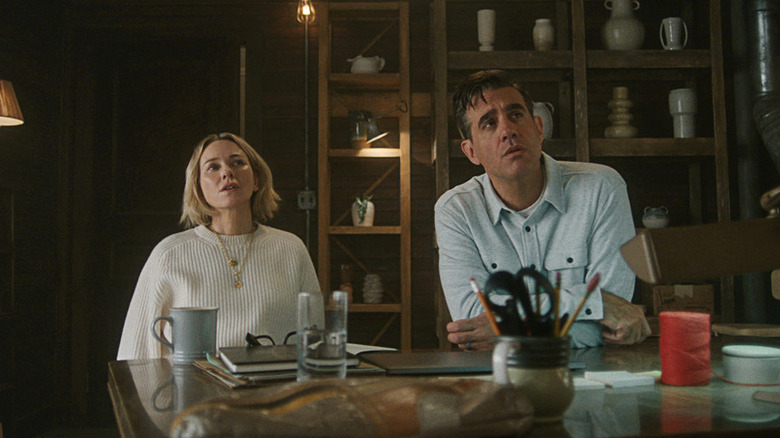The Watcher Cast Isn't Concerned About Potential Backlash
True crime and true crime fictionalization have been popular entertainment genres for decades. From "Goodfellas" to "Dahmer – Monster: The Jeffrey Dahmer Story," society can't help but allow fascination with the taboo, the macabre, and the illicit to only grow. That is why networks and streamers never stop pumping true crime documentaries and "based on true events" fiction series to capitalize on the need to explore the unexplainable human darkness.
Netflix's new entry into the true crime fictionalization genre is the thrilling story "The Watcher." The series stars Naomi Watts ("The Ring," "Mulholland Drive"), Bobby Cannavale ("The Irishman," "Jumanji: Welcome to the Jungle"), and Jennifer Coolidge ("American Pie," "The White Lotus"). It follows Nora (Watts) and Dean (Cannavale) Brannock, who purchase the home of their dreams and, soon after moving in, start to receive threatening letters signed, "The Watcher." Their neighbors and community members begin to act in weird ways in a psychological thriller based on a true story.
But like all stories that are based on actual events, this one has people who actually lived through it (or their descendants/relatives) around to possibly criticize every detail of the portrayal onscreen. Netflix is no stranger to this phenomenon as they experienced this backlash very recently with "Dahmer – Monster: The Jeffrey Dahmer Story." Regardless of the backlash, the series was still a massive hit, as detailed by Forbes, and Netflix is surely hoping "The Watcher" does the same. The cast, however, didn't have any fear they would have to defend their recent project, and here is why.
Much of the series was fictionalized
The cast sat down with The Hollywood Reporter and explained that they weren't worried about the backlash because it was more inspired by the events instead of closely following them to present an accurate representation. "The story is based on that story, but really, it's a Ryan Murphy creation," Bobby Cannavale told the publication. He also spoke about his preparation for the role by revealing that he wasn't attempting to portray the real person. "I didn't try to meet him. I'm not really playing him," he said. "I worked very closely with Ryan in coming up with this guy. It's a portrait of the American dream, so you talk about it and decide on what version of that you're trying to tell."
Naomi Watts echoed the same sentiment when discussing her portrayal of Nora, "I really trusted the scripts. After reading the article, that was plenty, so we didn't need to go reach out to the real people, although the story was quite known." Watts went on to say that since audiences didn't really know them as people, the audience won't nit-pick the mannerisms or the speech patterns of the actors. It wouldn't be something like a representation of the O.J. Simpson trial, which was plastered all over the news and familiarized people with the people involved.
Another consideration the cast and crew have to face is the people involved believing the actors and story portray them poorly. Margo Martindale, who plays one of the creepy neighbors, addressed that fear by saying, "I don't think they're depicted in a bad way," she said. "It stays true to a lot of the facts of things that happened to them, but then it goes off into darker places."
The true story was chronicled in an article
The real story happened in Westfield, New Jersey in 2014 and happened to Derek and Maria Broaddus. The letters started off as a friendly welcome to the neighborhood and then descended into madness with the claim that the author's father watched the house in the '60s and his grandfather in the '20s.
The story was chronicled in New York Magazine in November of 2018 by writer Reeves Weideman. The story goes that the Broaddus family moved into the home and shortly after began receiving letters from someone calling himself "The Watcher." The author of the letters eluded to the history of the house and "what lies within the walls." The letters continued, detailing the family's movements and even the number of children they had. The police responded and were just as baffled. The family was terrorized by the author, who taunted them by telling them he could be in any car that passed by their house.
You can read a deeper account of this story over at The Cut, and you can see the fictionalized version of the story on Netflix. Regardless of the latter's accuracy, the story is bone-chilling in both narratives.


